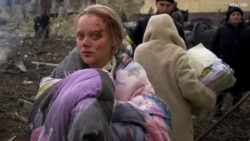On June 15, the United Nations Security Council met to discuss the protection and empowerment of women in conflict-affected countries, including Ukraine.
U.N. Secretary-General Antonio Guterres said Russia’s invasion of Ukraine had forced millions of women and children to flee for their lives. As of June 3, the U.N.’s human rights office had received 124 reports of sexual violence in Ukraine, mostly against women and girls.
Helga Maria Schmid, the secretary-general of the Organization for Security and Co-operation in Europe, said that in Russia’s war on Ukraine, “women and girls have been the victims of rape and face a high risk of trafficking and violence.”
But Russia’s U.N. ambassador, Vasily Nebenzya, said there is no evidence that Russia troops committed sexual crimes.
“You, the Western colleagues, won’t manage to exploit the topic of the alleged cases of sexual violence in Ukraine involving Russian servicemen. Fakes and lies are all that you have,” Nebenzya said.
That is false.
On June 6, Pramila Patten, the United Nations Special Representative of the Secretary-General on Sexual Violence in Conflict, told the U.N. Security Council that allegations of sexual violence committed by Russian soldiers in Ukraine are mounting.
Patten said a national hotline in Ukraine had received reports of sexual violence crimes “ranging from gang rape to coercion to watch[ing] an act of sexual violence committed against a partner or a child.”
Patten said documenting the cases has been difficult because of active hostilities, mass internal displacement and the destruction of hospitals. Because of the stigma associated with sexual violence, victims have been unwilling or unable to report to authorities or service providers.
“In the current context, many allegations of conflict-related sexual violence are difficult if not impossible to verify, making it challenging to assess the violence,” Patten said.
Natalia Karbowska, a co-founder and director of strategic development for the Ukrainian Women’s Fund, told the Security Council that Russia is using sexual violence as a tool of terror.
She said Russian troops also have forcefully taken women and children to camps in Russia, putting them at risk of being exploited for sex or labor.
Accounts of sexual violence in Ukraine emerged soon after Russia launched its invasion on February 24. In March, Ukrainian Foreign Minister Dmytro Kuleba accused Russian soldiers of committing sexual violence in multiple Ukrainian cities.
Some Ukrainian women told their stories to journalists.
On June 8, a 19-year-old Ukrainian woman now living in a refugee camp in Poland told The Washington Post she was raped by a Russian soldier. The woman said she was sheltering in a basement with her neighbor in Mariupol in March when soldiers raided. She realized that the soldiers, who were drunk, were Chechen fighters from Russia’s North Caucasus region.
The woman said the soldiers asked them to show documents. One stopped her, put her hand on her cheek and complimented her nose and then asked her name. He then took her to the building’s second floor and threatened to kill her if she didn’t do what he said.
Kateryna Cherepakha, director of the hotline service La Strada Ukraine, told the Post most victims are unwilling to talk to police or a prosecutor. Since February, the hotline received 16 calls from people claiming rape by Russian forces, including three minors, the youngest age 13.
In 2008, the U.N. Security Council unanimously adopted a resolution classifying rape as a weapon of war.
In April, Human Rights Watch (HRW) said it documented several war crimes committed by Russian soldiers, including summary executions and rape, in the occupied Ukrainian areas of Chernihiv, Kharkiv and Kyiv.
HRW said it interviewed 10 people in person or by telephone, and that some “asked to be identified only by their first names or by pseudonyms for their protection.”
“Olha,” a 31-year-old, said a Russian soldier repeatedly raped her in a school in the Kharkiv region, where she was sheltering with her family. Olha said the soldier cut her face and hair with a knife, hit her with a book and slapped her to force her to stay in a classroom.
On April 11, the BBC reported allegations that a Russian soldier raped a 50-year-old woman and killed her husband in a rural neighborhood west of Kyiv. The woman, identified only as “Anna,” told the BBC she was at home with her husband on March 7 when a Russian soldier barged in.
"At gunpoint, he took me to a house nearby. He ordered me: 'Take your clothes off or I'll shoot you.' He kept threatening to kill me if I didn't do as he said. Then he started raping me,” Anna said.
Later, four more soldiers entered and took the soldier away. When she returned home, she found her husband had been shot. Fighting prevented getting him to a hospital. He died of his injuries, and Anna buried him in their backyard.






